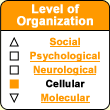At the cellular level, when no illness or injury is involved, forgetting short-term memories and forgetting long-term memories represent two different processes.
In short-term memory, when something is forgotten, it means that a nerve impulse has ceased being transmitted in a particular neural network. In general, unless an impulse is reactivated, it stops flowing through a network after a few seconds.
In long-term memory, forgetting occurs when the formerly strengthened connections among the neurons in a network weaken, or when the activation of a new network is superimposed on an older one, thus causing interference. |







